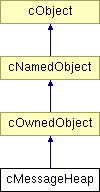cMessageHeap Class Reference
[Internal classes]
Stores the future event set. More...
#include <cmessageheap.h>

Classes | |
| class | Iterator |
| Walks along a cMessageHeap. More... | |
Public Member Functions | |
Constructors, destructor, assignment | |
| cMessageHeap (const cMessageHeap &msgq) | |
| cMessageHeap (const char *name=NULL, int size=128) | |
| virtual | ~cMessageHeap () |
| cMessageHeap & | operator= (const cMessageHeap &msgqueue) |
Redefined cObject member functions. | |
| virtual cMessageHeap * | dup () const |
| virtual std::string | info () const |
| virtual void | forEachChild (cVisitor *v) |
Container functions. | |
| void | insert (cMessage *event) |
| cMessage * | peekFirst () const |
| cMessage * | peek (int m) |
| cMessage * | removeFirst () |
| cMessage * | remove (cMessage *event) |
| void | sort () |
| void | clear () |
| int | getLength () const |
| bool | isEmpty () const |
| int | length () const |
| bool | empty () const |
Detailed Description
Stores the future event set.
The underlying data structure is heap; the array used to store the heap expands as needed.
- See also:
- Iterator
Member Function Documentation
| virtual cMessageHeap* cMessageHeap::dup | ( | ) | const [inline, virtual] |
| virtual void cMessageHeap::forEachChild | ( | cVisitor * | v | ) | [virtual] |
| virtual std::string cMessageHeap::info | ( | ) | const [virtual] |
| cMessageHeap& cMessageHeap::operator= | ( | const cMessageHeap & | msgqueue | ) |
Assignment operator.
The name member is not copied; see cOwnedObject's operator=() for more details.
| cMessage* cMessageHeap::peek | ( | int | m | ) |
Returns the mth message in the heap if 0 <= m < getLength(), and NULL otherwise.
Note that iteration does not necessarily return messages in increasing timestamp (getArrivalTime()) order unless you called sort() before.
| cMessage* cMessageHeap::peekFirst | ( | ) | const |
Peek the first message in the heap (the one with the smallest timestamp.
) If the heap is empty, it returns NULL.
Removes and returns the given message in the heap.
If the message is not in the heap, returns NULL.
| cMessage* cMessageHeap::removeFirst | ( | ) |
Removes and return the first message in the heap (the one with the smallest timestamp.
) If the heap is empty, it returns NULL.
| void cMessageHeap::sort | ( | ) |
Sorts the contents of the heap.
This is only necessary if one wants to iterate through in the FES in strict timestamp order.
The documentation for this class was generated from the following file:
 1.6.3
1.6.3